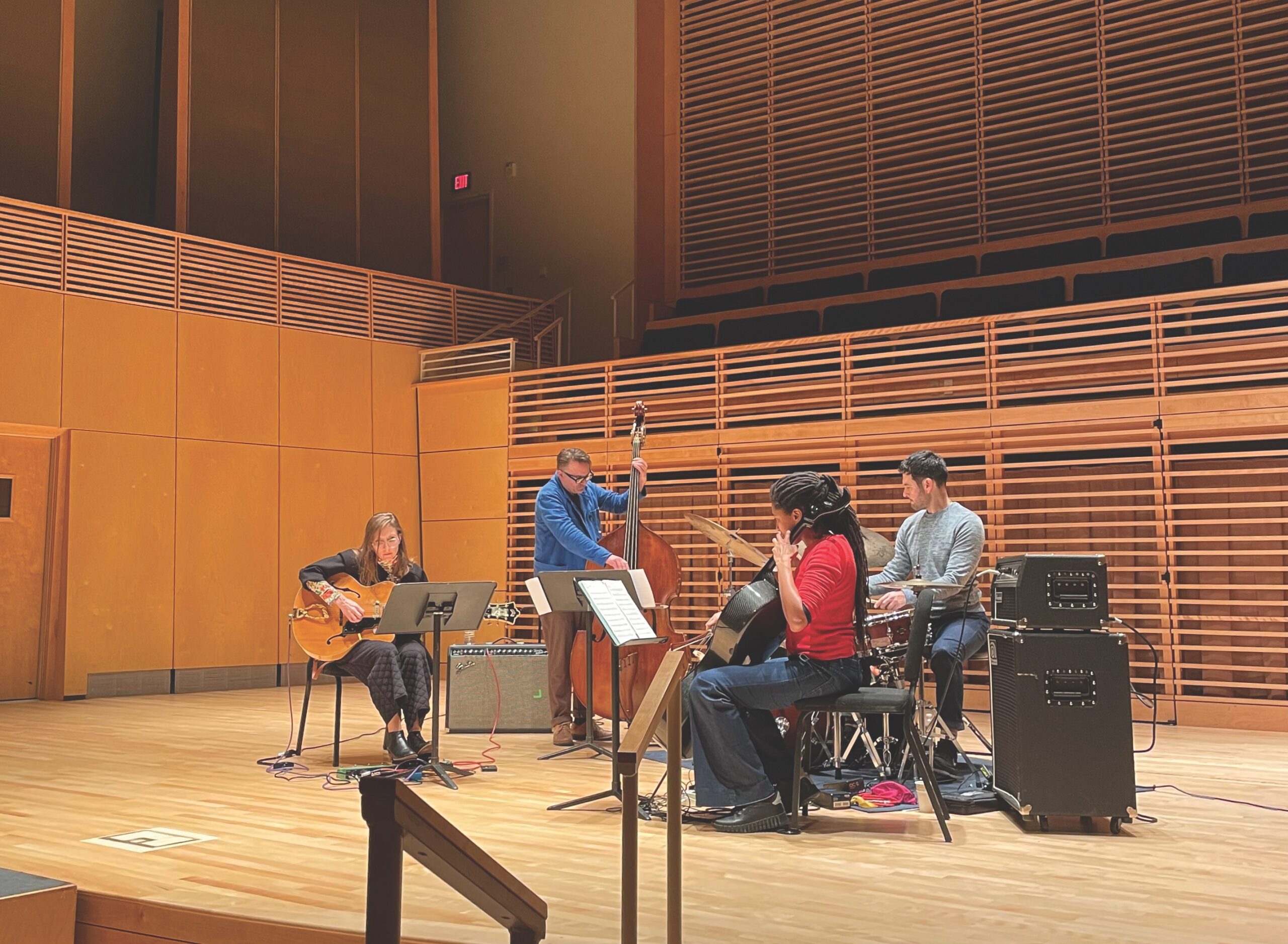Breaking jazz tradition with the 7 Poets Trio and The Tomeka Reid Quartet
March 1, 2024
 Julia Dickinson
Julia DickinsonLast Friday, jazz drummer Tomas Fujiwara’s 7 Poets Trio and The Tomeka Reid Quartet enlivened Studzinski Recital Hall’s Kanbar Auditorium with a distinctive jazz show.
Fujiwara and Reid are members of both groups. The 7 Poets Trio also features musician Patricia Brennan on vibraphone while the Tomeka Reid Quartet adds bassist Jason Roebke and guitarist Mary Halvorson.
A unique aspect of the performance was Reid’s incorporation of the cello—an instrument used almost exclusively in Western classical music—into jazz, using bowing, plucking, sliding and tapping to evoke a variety of sounds from the instrument.
Jacob Goodman ’26 appreciated how Reid included non-traditional jazz instruments like the cello in jazz music.
“In jazz, there’s not really any limitations on what you can or can’t do, especially with the type of improvisation that they’re doing,” Goodman said. “I think the non-traditional instruments only add [to the performance].”
Other musicians in the ensembles experimented with their instruments in novel ways. During The Tomeka Reid Quartet’s set, Fujiwara flipped over the snare and dropped bells tied on a string on the drum. While playing with the 7 Poets Trio, an electronic modification on the vibraphone allowed Brennan to bend the pitch of the instrument beyond its standard capabilities.
With two-thirds of the group consisting of traditional rhythm section instruments, the 7 Poets Trio leaned heavily into rhythmic patterns and timing in its performance. The Tomeka Reid Quartet, on the other hand, with a larger string section, frequently featured harmonic tension and resolution in their performance.
Music students at Bowdoin were able to learn from the performers firsthand. The afternoon before the concert, students in an improvisation course taught by Associate Professor of Music Tracy McMullen took part in a masterclass with both ensembles.
During the class, the musicians of the 7 Poets Trio and The Tomeka Reid Quartet read through student-composed graphic scores—an alternative form of composition that experiments with shapes and colors. After a few rounds of improvisation, students began to join the professional musicians in playing their own and their peers’ compositions.
For Goodman, who plays guitar and is in McMullen’s class, the experience of not only performing with acclaimed musicians but also performing his and his classmates’ work was rewarding.
“We were lucky enough to have them perform our graphic score for this masterclass and then they gave us feedback on it. And then we had the opportunity to play with them, which is really cool,” Goodman said.
Selima Terras ’26 also attended the masterclass and appreciated Reid’s understanding of music as a language.
“She was like, ‘This is a score that seems like it’s facilitating language,’” Terras said. “It’s really emphasizing that each person has a voice and you’re just giving them some tools to be able to interact with each other, so it’s really like facilitating a language exchange between instruments.”
Terras also enjoyed observing the groups play in careful coordination during their show—learning from the way the musicians communicated with each other mid-performance without detracting from the music.
“I was sitting in the front row, and I could catch them smiling as one person was soloing or I could catch them just making little elbow moves to signal that they were moving to the next part or that there was a pause coming up, and really seeing how the ensemble works together,” Terras said.
For Terras, a cellist herself, the opportunity to see the ensembles and Reid perform encouraged her to develop her own music in new directions.
“I wouldn’t be surprised if, in a few weeks, months or years from now, I join a jazz ensemble because of Tomeka Reid,” Terras said.

Comments
Before submitting a comment, please review our comment policy. Some key points from the policy: